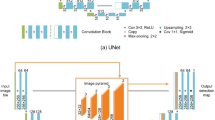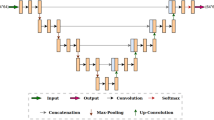Abstract
Loess landslides are one of the geological hazards prevalent in mountainous areas of Loess Plateau, seriously threatening people’s lives and property safety. Accurate identification of landslides is a prerequisite for reducing the risk of landslide hazards. Traditional landslide interpretation methods often have the disadvantage of being laborious and difficult to use on a large scale compared with the recently developed deep learning-based landslide detection methods. In this study, we propose an improved deep learning model, landslide detection- you only look once (LD-YOLO), based on the existing you only look once (YOLO) model for the intelligent identification of old and new landslides in loess areas. Specifically, remote sensing images of landslides in Baoji City, Shaanxi Province, China are acquired from the Google Earth Engine platform. The landslide images of Baoji City (excluding Qianyang County) are used to establish a loess landslide dataset for training the model. The landslide data of Qianyang County is used to verify the detection performance of the model. The focal and efficient IoU (Focal-EIoU) loss function and efficient channel attention (ECA) mechanism are incorporated into the 7th version of YOLO (YOLOv7) model to construct the LD-YOLO model, which makes it more suitable for the landslide detection task. The experiments yielded an improved LD-YOLO model with average precision of 92.05%, precision of 92.31%, recall of 90.28%, and F1-score of 91.28% for loess landslide detection. The landslides in Qianyang County were divided into two test sets, new landslides and old landslides, which were used to test the detection performance of LD-YOLO for both types of landslides. The results show that LD-YOLO detects old landslides with a detection precision of 82.75% and a recall of 80%. When detecting new landslides, the detection precision is 94.29% and the recall is 91.67%. It indicates that our proposed LD-YOLO model has strong detection performance for both new and old landslides in loess areas. Through a proposed solution that can realize the accurate detection of landslides in loess areas, this paper provides a valuable reference for the application of deep learning methods in landslide identification.
Similar content being viewed by others
Availability of Data/Materials: The location information, topography information, and remote sensing images involved in this study were obtained from the Google Earth Engine (GEE) and Data Center for Resources and Environmental Sciences, Chinese Academy of Sciences (RESDC) (http://www.resdc.cn/DataList.aspx).
References
Amato G, Eisank C, Albrecht F (2017) A simple and unsupervised semi-automatic workflow to detect shallow landslides in Alpine areas based on VHR remote sensing data. EGU General Assembly Conference Abstracts 2017: 942. https://doi.org/10.13140/RG.2.2.15848.06400
Brideau MA, Sturzenegger M, Stead D, et al. (2012) Stability analysis of the 2007 Chehalis Lake landslide based on longrange terrestrial photogrammetry and airborne LiDAR data. Landslides 9(1): 75–91. https://doi.org/10.1007/s10346-011-0286-4
Bui DT, Tsangaratos P, Nguyen V-T, et al. (2020) Comparing the prediction performance of a deep learning neural network model with conventional machine learning models in landslide susceptibility assessment. Catena 188: 104426. https://doi.org/10.1016/j.catena.2019.104426
Casagli N, Intrieri E, Tofani V, et al. (2023) Landslide detection, monitoring and prediction with remote-sensing techniques. Nat Rev Earth Environ 4: 51–64. https://doi.org/10.1038/s43017-022-00373-x
Chang Z, Du Z, Zhang F, et al. (2020) Landslide susceptibility prediction based on remote sensing images and GIS: Comparisons of supervised and unsupervised machine learning models. Remote Sens 12(3): 502. https://doi.org/10.3390/rs12030502
Chen J, Bai S, Wan G, et al. (2023) Research on YOLOv7-based defect detection method for automotive running lights. Syst Sci Control Eng 11: 2185916. https://doi.org/10.1080/21642583.2023.2185916
Chen W, Li Y (2020) GIS-based evaluation of landslide susceptibility using hybrid computational intelligence models. Catena 195: 104777. https://doi.org/10.1016/j.catena.2020.104777
Chen W, Chai H, Zhao Z, et al. (2016) Landslide susceptibility mapping based on GIS and support vector machine models for the Qianyang County, China. Environ Earth Sci 75: 474. https://doi.org/10.1007/s12665-015-5093-0
Cheng L, Li J, Duan P, Wang M (2021a) A small attentional YOLO model for landslide detection from satellite remote sensing images. Landslides 18: 2751–2765. https://doi.org/10.1007/s10346-021-01694-6
Cheng Z, Gong W, Tang H, et al. (2021b) UAV photogrammetry-based remote sensing and preliminary assessment of the behavior of a landslide in Guizhou, China. Engineering Geology 289: 106172. https://doi.org/10.1016/j.enggeo.2021.106172
Czikhardt R, Papco J, Bakon M, et al. (2017) Ground stability monitoring of undermined and landslide prone areas by means of sentinel-1 multitemporal InSAR, case study from Slovakia. Geosciences 7: 87. https://doi.org/10.3390/geosciences7030087
Ding A, Zhang Q, Zhou X, et al. (2016) Automatic recognition of landslide based on CNN and texture change detection. 2016 31st Youth Academic Annual Conference of Chinese Association of Automation (YAC), pp 444–448. https://doi.org/10.1109/YAC.2016.7804935
Diwan T, Anirudh G, Tembhurne JV (2023) Object detection using YOLO: challenges, architectural successors, datasets and applications. Multimed Tools Appl 82: 9243–9275. https://doi.org/10.1007/s11042-022-13644-y
Dou J, Yunus AP, Bui DT, et al. (2019) Improved landslide assessment using support vector machine with bagging, boosting, and stacking ensemble machine learning framework in a mountainous watershed, Japan. Landslides 17: 641–658. https://doi.org/10.1007/s10346-019-01286-5
Fan X, Scaringi G, Korup O, et al. (2019) Earthquake-induced chains of geologic hazards: Patterns, mechanisms, and impacts. Rev Geophys 57: 421–503. https://doi.org/10.1029/2018RG000626
Ghaderpour E (2021) JUST: MATLAB and python software for change detection and time series analysis. GPS Solut 25(3): 85. https://doi.org/10.1007/s10291-021-01118-x
Ghorbanzadeh O, Blaschke T, Gholamnia K, et al. (2019) Evaluation of different machine learning methods and deep- learning convolutional neural networks for landslide detection. Remote Sens 11(2): 196. https://doi.org/10.3390/rs11020196
Ghorbanzadeh, O, Xu Y, Ghamisi P, et al. (2022) Landslide4sense: reference benchmark data and deep learning models for landslide detection. IEEE Trans. Geosci Remote Sens 60: 1–17. https://doi.org/10.1109/TGRS.2022.3215209
Hou H, Chen M, Tie Y, et al. (2022) A universal landslide detection method in optical remote sensing images based on improved YOLOX. Remote Sens 14: 4939. https://doi.org/10.3390/rs14194939
Ji S, Yu D, Shen C, et al. (2020) Landslide detection from an open satellite imagery and digital elevation model dataset using attention boosted convolutional neural networks. Landslides 17: 1337–1352. https://doi.org/10.1007/s10346-020-01353-2
Li H, Xu Q, He Y, et al. (2021a) Temporal detection of sharp landslide deformation with ensemble-based LSTM-RNNs and hurst exponent. Geomatics Geomat Nat Hazrisk 12: 3089–3113. https://doi.org/10.1080/19475705.2021.1994474
Li L, Xu C, Xu X, et al. (2021) Inventory and distribution characteristics of large-Scale landslides in Baoji City, Shaanxi Province, China. Isprs Int J Geo-Inf 11(1): 10. https://doi.org/10.3390/ijgi11010010
Li X, Wang W, Hu X, et al. (2021b) Generalized focal loss V2: learning reliable localization quality estimation for dense object detection. 2021 IEEE/CVF Conference on Computer Vision and Pattern Recognition (CVPR) 2021: 11632–11641. https://doi.org/10.48550/arXiv.2011.12885
Lin TY, Goyal P, Girshick R, et al. (2017) Focal loss for dense object detection. IEEE T Pattern Anal 2017: 2980–2988. https://doi.org/10.48550/arXiv.1708.02002
Liu T, Chen T, Niu R, et al. (2021) Landslide detection mapping employing CNN, ResNet, and DenseNet in the three gorges reservoir, China. IEEE J-STARS 14: 11417–11428. https://doi.org/10.1109/JSTARS.2021.3117975
Lu P, Qin Y, Li Z, et al. (2019) Landslide mapping from multisensor data through improved change detection-based Markov random field. Remote Sens Environ 231: 111235. https://doi.org/10.1016/j.rse.2019.111235
Ma Z, Mei G (2021) Deep learning for geological hazards analysis: Data, models, applications, and opportunities. Earth-Sci Rev 223: 103858. https://doi.org/10.1016/j.earscirev.2021.103858
Mahmoud A, Mohamed S, El-Khoribi R, et al. (2020) Object detection using adaptive mask RCNN in optical remote sensing images. Int J Intell Eng Syst 13(1): 65–76. https://doi.org/10.22266/ijies2020.0229.07
Martha TR, Kerle N, Jetten V, et al. (2010) Characterising spectral, spatial and morphometric properties of landslides for semi-automatic detection using object-oriented methods. Geomorphology 116: 24–36. https://doi.org/10.1016/j.geomorph.2009.10.004
Paste AS, Chickerur S (2019) Analysis of instance segmentation using mask-rcnn, 2019 2nd International Conference on Intelligent Computing, Instrumentation and Control Technologies (ICICICT). IEEE 2019: 191–196. https://doi.org/10.1109/ICICICT46008.2019.8993224
Qi J, Liu X, Liu K (2022) An improved YOLOv5 model based on visual attention mechanism: Application to recognition of tomato virus disease. Comput Electron Agr 194: 106780. https://doi.org/10.1016/j.compag.2022.106780
Qing Y, Liu W (2021) Hyperspectral image classification based on multi-scale residual network with attention mechanism. Remote Sens 13(3): 335. https://doi.org/10.3390/rs13030335
Reddy ESTK, Rajaram V (2022) Pothole detection using CNN and YOLO v7 algorithm. 2022 6th International Conference on Electronics, Communication and Aerospace Technology 2022: 1255–1260. https://doi.org/10.1109/ICECA55336.2022.10009324
Sathvik M, Saranya G, Karpagaselvi S (2022) An intelligent convolutional neural network based potholes detection using YOLO-V7. 2022 International Conference on Automation, Computing and Renewable Systems (ICACRS), pp 813–819. https://doi.org/10.1109/ICACRS55517.2022.10029263
Soydaner D (2022) Attention mechanism in neural networks: Where it comes and where it goes. Neural Comput & Applic 34: 13371–13385. https://doi.org/10.1007/s00521-022-07366-3
Tian Y, Duo S, Stanislao L, et al. (2022) Recent advances on loss functions in deep learning for computer vision, Neurocomputing 497: 129–158. https://doi.org/10.1016/j.neucom.2022.04.127.
Xu D, Wu Y (2020) Improved YOLO-V3 with densenet for multi-scale remote sensing target detection. Sensors 20(15): 4276. https://doi.org/10.3390/s20154276
Xu L, Yan D, Zhao T (2021) Probabilistic evaluation of loess landslide impact using multivariate model. Landslides 18: 1011–1023. https://doi.org/10.1007/s10346-020-01521-4
Wang C, Zhou Y, Li J (2022) Lightweight Yolov4 target detection algorithm fused with ECA mechanism. Processes 10(7): 1285. https://doi.org/10.3390/pr10071285
Wang Q, Li W, Chen W, et al. (2015) GIS-based assessment of landslide susceptibility using certainty factor and index of entropy models for the Qianyang County of Baoji City, China. J Earth Syst Sci 124: 1399–1415. https://doi.org/10.1007/s12040-015-0624-3
Yu B, Chen F, Xu C (2020) Landslide detection based on contour based deep learning framework in case of national scale of Nepal in 2015. Geosciences 135: 104388. https://doi.org/10.1016/j.cageo.2019.104388
Yu Z, Chang R, Chen Z (2022) Automatic detection method for loess landslides based on GEE and an improved YOLOX algorithm. Remote Sens 14(18): 4599. https://doi.org/10.3390/rs14184599
Zhang H, Wang Y, Dayoub F, et al. (2021) VarifocalNet: An IoU- aware dense object detector. 2021 IEEE/CVF Conference on Computer Vision and Pattern Recognition (CVPR), pp 8510–8519. https://doi.org/10.1109/CVPR46437.2021.00841
Zhang K, Wang S, Bao H, et al. (2019) Characteristics and influencing factors of rainfall-induced landslide and debris flow hazards in Shaanxi Province, China. Nat Hazard Earth Sys 19: 93–105. https://doi.org/10.5194/nhess-19-93-2019
Zhu X, Cheng D, Zhang Z, et al. (2019) An empirical study of spatial attention mechanisms in deep networks. 2019 IEEE/CVF International Conference on Computer Vision (ICCV) 2019: 6687–6696. https://doi.org/10.1109/ICCV.2019.00679
Zhuang J, Peng J (2014) A coupled slope cutting-a prolonged rainfall-induced loess landslide: A 17 October 2011 case study. B Eng Geol Environ 73(4): 997–1011. https://doi.org/10.1007/s10064-014-0645-1
Acknowledgments
The paper was supported by the Huainan Normal University Natural Science Research (Grants No. 2022XJYB034), the Fundamental Research Funds for the Central Universities, CHD (Grants No. 300102352506), and the Natural Science Foundation of Anhui Colleges (Grants No. KJ2020A0313).
Author information
Authors and Affiliations
Contributions
Material preparation, data collection and analysis were performed by LIU Qing, WU Ting-ting, DENG Ya-hong, LIU Zhi-heng. The first draft of the manuscript was written by LIU Qing and all authors commented on previous versions of the manuscript. All authors read and approved the final manuscript.
Corresponding author
Ethics declarations
Conflict of Interest: The authors declare no conflict of interest.
Rights and permissions
About this article
Cite this article
Liu, Q., Wu, Tt., Deng, Yh. et al. Intelligent identification of landslides in loess areas based on the improved YOLO algorithm: a case study of loess landslides in Baoji City. J. Mt. Sci. 20, 3343–3359 (2023). https://doi.org/10.1007/s11629-023-8128-0
Received:
Revised:
Accepted:
Published:
Issue Date:
DOI: https://doi.org/10.1007/s11629-023-8128-0




